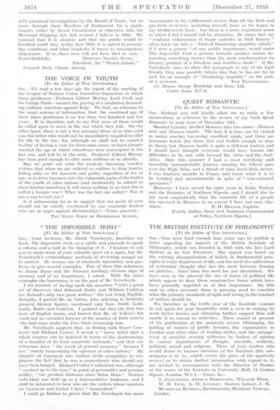"THE IMPOSSIBLE IRISH"
[To the Editor of THE SPnerATort.] .SIR,—Your reviewer, Mr. Derek Verschoyle, describes my -book, The Impossible Irish, as a squib, and proceeds to spout a column and a half in the damping of it. I hesitate to ask you to waste more of your valuable space on a squib, but Mr. Verschoyle's extraordinary methods of reviewing compel me to protest. He accuses me of wholesale inaccuracy and pro- .fesses to give several examples. Two of these (the references to James Joyce and the Norman landing), obvious slips of memory and of no importance, I admit: 'With the other examples the inaccuracy is on the part of Mr. VerschoyIe.
I am accused of having made the assertion "with a great air of discovery • that Edmund Burke and William Carleton are Ireland's only two great writers," the rest being English. Actually, I quoted Mr. de Valera, who, referring to Ireland's greatest• literary figures, mentioned only four—Swift, Gold- smith, Burke and Carleton. I pointed out that the first two were of English strain, and hinted that Mr. de Valera's list could not be extended because of the number of Irish writers who had come under the Free State censorship ban.
Mr. Verschoyle suggests that, in dealing with Roger Case- ment and Richard Croker, I reveal a "naive belief that a whole country can be indicted in terms of the shortcomings of a handful of its least reputable nationals," and that my references- have "the merit of general accuracy" because am "merely transcribing tile opinions of other writers." My chapter on Casement was written (with sympathy) to em- phasise the fact that he was a neurasthenic who should not have been hanged. Richard Croker I submitted was, although "crooked up to the eyes," in point of personality and genuine "the greatest Irishman since Brian Bonn" Neither individual was held up as a representative Irishman, and I shall be interested to hear who are the writers whose opinions on Casement and Croker I have "transcribed."
I could go further to prove that Mr. Verschoyle has more
inaccuracies in his I,000-words review than all the Irish and pro-Irish reviewers, including himself, have so far found in my 50,000-words book ; but there is a more important point to which I feel I should call his attention. He states that my "exultant exhumation of tragic episodes in Irish history" often leads me into a " kind of blundering stupidity which," if I were a person "of any public importance, would make The Impossible Irish a gesture towards another ,,nation de- manding something sterner than the mere condemnation on literary grounds of a frivolous and worthless book." If Mr. Verschoyle cares to show this paragraph to any of his legal friends, they may possibly inform him that he has not far to seek for an example of "blundering stupidity" on the part
of a reviewer. Tom PENHALIG ON. c/o Messrs. George Routledge and Sons, Ltd. Carter Lane, E.C.4.


































 Previous page
Previous page